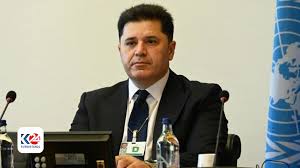KRG Official Calls for Legal Framework to Address ISIS Crimes and Ensure Justice for Victims
"The Iraqi judiciary has yet to take the necessary legal steps to prosecute perpetrators, secure accountability, and ensure adequate compensation for the families of victims," Zebari stated.

ERBIL (Kurdistan24) — The absence of a national legal framework recognizing ISIS crimes as international offenses remains a major obstacle to justice. The Iraqi judiciary has yet to take the necessary legal steps to prosecute perpetrators, secure accountability, and ensure adequate compensation for the families of victims, Dindar Zebari, Coordinator for International Advocacy of the Kurdistan Regional Government (KRG), stated on Monday.
Zebari, affirmed that the atrocities committed by ISIS in August 2014 against the Yazidis represent one of the most appalling manifestations of genocide in contemporary history. In response, the Kurdistan Regional Government (KRG) implemented urgent measures aimed at rescuing victims and addressing the severe humanitarian consequences of these crimes, read a statement published by Zebari on Tuesday.
The KRG’s response spanned multiple critical areas. Peshmerga forces, working closely with the Global Coalition against ISIS, played a decisive role in liberating Yazidi areas, particularly the district of Sinjar, while opening humanitarian corridors that enabled the rescue of thousands of civilians.
Additional efforts included providing shelter for displaced persons, liberating abductees, advocating for international recognition of ISIS crimes as genocide, and coordinating with international partners to document atrocities. Zebari highlighted the sacrifices of the Peshmerga, noting that 1,814 fighters were martyred, 10,725 were wounded, and 44 remain unaccounted for.
Regarding abducted Yazidis, Zebari stated that 6,417 civilians were kidnapped during ISIS attacks. To date, 3,590 abductees have been rescued, while the fate of 2,827 remains unknown. Over 1,100 Yazidi women survivors have been transferred to Germany for specialized care, including psychological support, and hundreds continue to receive protection services annually.
In addition, more than 2,000 women have benefited from economic and social empowerment initiatives such as vocational training and community reintegration programs. In 2023 alone, over 1,500 women received psychological support, healthcare, and vocational training, with 70% actively participating in rehabilitation programs.
The KRG has also systematically documented ISIS crimes to ensure accountability. As of 1 June 2025, records maintained by the Commission for Investigation and Evidence Gathering include 2,991 lawsuits, 3,290 complaints, and 3,090 registered missing persons—1,222 female and 1,868 male. Furthermore, 2,848 survivors, including 1,884 females and 964 males, have received psychological and social support.
On the subject of mass graves, Zebari noted that exhumation began in Sinjar in 2019. Since then, 91 mass graves have been identified, with 54 opened, including six located in disputed territories under Article 140 of the Iraqi Constitution. The remains of 360 victims have been recovered. Of these, 318 have been reburied across eight phases—132 at the Sinjar Martyrs Memorial and 186 returned to the villages of Kocho and Hardan.
ISIS’s atrocities in Iraq between 2014 and 2017 left deep scars on the country’s social fabric. The extremist group carried out mass executions, abductions, and forced displacements, targeting religious and ethnic minorities, including Yazidis, Christians, Turkmen, and Shabaks, with acts the United Nations has described as possible genocide.
Thousands of women and girls were enslaved, while entire communities were destroyed or uprooted, leaving a legacy of trauma and unresolved displacement. Despite the group’s territorial defeat in 2017, tens of thousands of victims and their families continue to await accountability, reparations, and the formal recognition of the crimes as crimes against humanity and genocide under Iraqi law.
